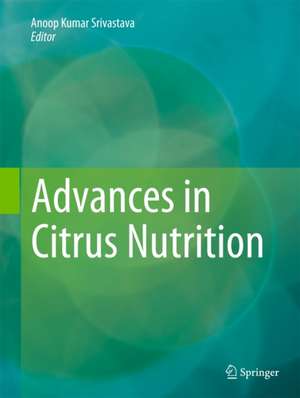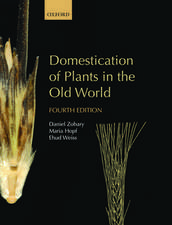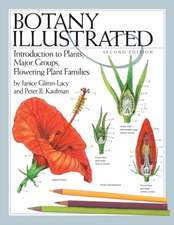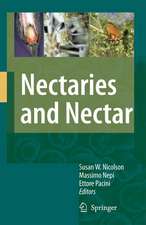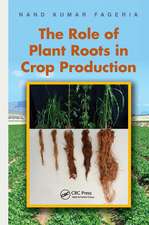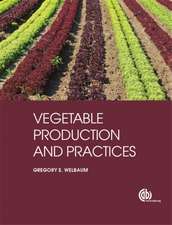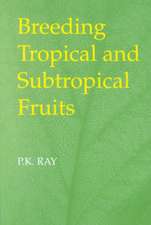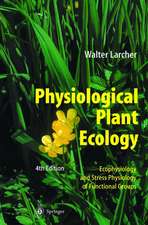Advances in Citrus Nutrition
Editat de Anoop Kumar Srivastavaen Limba Engleză Hardback – 7 iun 2012
| Toate formatele și edițiile | Preț | Express |
|---|---|---|
| Paperback (1) | 968.19 lei 6-8 săpt. | |
| SPRINGER NETHERLANDS – 12 iun 2014 | 968.19 lei 6-8 săpt. | |
| Hardback (1) | 975.73 lei 3-5 săpt. | |
| SPRINGER NETHERLANDS – 7 iun 2012 | 975.73 lei 3-5 săpt. |
Preț: 975.73 lei
Preț vechi: 1189.92 lei
-18% Nou
Puncte Express: 1464
Preț estimativ în valută:
186.73€ • 194.23$ • 154.16£
186.73€ • 194.23$ • 154.16£
Carte disponibilă
Livrare economică 25 martie-08 aprilie
Preluare comenzi: 021 569.72.76
Specificații
ISBN-13: 9789400741706
ISBN-10: 9400741707
Pagini: 700
Ilustrații: XIV, 478 p.
Dimensiuni: 210 x 279 x 33 mm
Greutate: 1.32 kg
Ediția:2012
Editura: SPRINGER NETHERLANDS
Colecția Springer
Locul publicării:Dordrecht, Netherlands
ISBN-10: 9400741707
Pagini: 700
Ilustrații: XIV, 478 p.
Dimensiuni: 210 x 279 x 33 mm
Greutate: 1.32 kg
Ediția:2012
Editura: SPRINGER NETHERLANDS
Colecția Springer
Locul publicării:Dordrecht, Netherlands
Public țintă
ResearchCuprins
Plant Nutrition and Defense Mechanism: Frontier Knowledge.- Antioxidant System in Citrus under Nutrient Stress Conditions: Latest Developments.- Phytopnoic Nutrients in Citrus : Biochemical and Molecular Evidence.- Foliar Nutrition: Current State of Knowledge and Opportunities.- Leaf Analysis in Citrus : Interpretation Tools.- Leaf Analysis in Citrus : Developments in Analytical Techniques.- Juice Analysis in Citrus: Latest Developments.- Trunk Nutrition.- Non-destructive Proximal Sensing for Early Detection of Citrus Nutrient and Water Stress.- Spectral Response of Citrus and their Application to Nutrient and Water Constraints Diagnosis.- Soil Enzyme Activities and Soil Fertility Dynamics.- Surfactant and Nutrient Uptake in Citrus.- Rhizosphere Microbial Communities: Isolation, Characterization and Value Addition for Substrate Development.- Biodynamic Soil Fertility Management.- Nutrient Use Efficiency in Citrus.- Nitrogen Citrus : Signal, Nutrient and Use Efficiency.- NitrogenMetabolism in Citrus Based on Expressed Tag Analysis.- Variable Rate Application of Fertilizer in Citrus.- Open Field Hydroponics: Concept and Application.- Fertigation: Concept and Application in Citrus.- Nutrient-Hormone Interactions in Citrus: Physiological Implications.- Lime-Induced Chlorosis in Citrus: Diagnoses Through Physiological and Metabolic Evidences.- Mycorrhiza in Citrus: Growth and Nutrition.- Organic Citrus: Soil Fertility and Plant Nutrition Management.- Integrated Nutrient Management in Citrus.- Citrus Best Management Practices.- Economic Analysis of Conventional and Alternative Nutrient Management Approaches.- Assessing Salinity Tolerance in Citrus: Latest Developments.- Physiological Responses and Tolerance of Citrus to Aluminum-Toxicity.- Fruit yield Estimation Through Multi-Spectral Imaging.
Textul de pe ultima copertă
Citrus nutrition has been the subject of worldwide research to not only soil scientists, but to researchers covering various other disciplines as well. Despite many breakthroughs in diagnosis and management of nutrient constraints, citrus nutritionists are still baffled by the complex processes associated with precise field diagnosis of different nutrient constraints. Hence, currently available diagnostic tools are more applicable to next season’s crop, instead of addressing the constraints in the current standing crop. In this regard, there has been some distinctive developments. For example, the application of geospatial tools including non-destructive proximal sensing, metalloenzymes through increasing involvement of genomics and metabolomics (e.g., expressed tag analysis), exploiting the dynamic relationship between soil enzymes and fertility variations, etc. Studying the partitioning of nutrients across critical growth stages has, not only improved our understanding on nutritional physiology, but enabled researchers to modulate nutrient requirement according to nutrient demand of growing leaves and fruits according to source-sink relationship. This is where nutrient use efficiency intervenes best to unravel many of the mysteries associated with nutrient requirement at various phenophases of crops. The major abiotic constraints in the form of calcium carbonate (induced iron chlorosis on alkaline soils and Al-toxicity; induced nutrient transformations on acid soils) have taken the understanding of citrus nutrition to another level of excellence, highlighting their significance in cutting down the efficiency of nutrient use. These developments have undoubtedly added a new dimension to diagnosis of nutrient constraints. As many as 30 chapters from 72 eminent researchers spread over 19 countries have made this maiden book on Citrus Nutrition more special both in terms of quality as well as attracting a global readership.
Caracteristici
Inter-disciplinary approach for diagnosing nutrient constraints and management strategies Loaded with future perspectives, preparing researchers for next generation strategic research Involvement of contributors highly accomplished in citrus nutrition research
